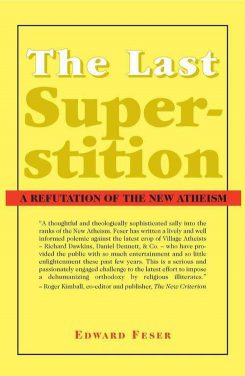The Last Superstition: Toothpaste and Universal Concepts
Chapter 2: Greeks Bearing Gifts, continued.
Continuing his discussion of Platonic Forms, Feser introduces this example (bold added):
[A] squirrel who likes to scamper up trees and gather nuts for the winter (or whatever) is going to be a more perfect approximation of the squirrel essence than one which, through habituation or genetic defect, prefers to eat toothpaste spread on Ritz crackers and to lay out “spread eagled” on the freeway. This entails a standard of goodness, and a perfectly objective one. It is not a matter of opinion whether the carefully drawn triangle is a better triangle than the hastily drawn one, nor a matter of opinion whether the toothpaste-eating squirrel is deficient as a squirrel. [p. 36]
But later in the paragraph, he tells us:
If a squirrel could be conditioned to want to eat nothing but toothpaste, it wouldn’t follow that this is good for him. Nor, if there were a genetic factor behind this odd preference, would it follow that it is normal for him, any more than a genetic factor behind blindness or clubfeet shows that being blind or having a clubfoot is normal even for those people who are tragically afflicted with these ailments.
Notice the equivocation: in the first part, Feser uses “good” in the sense of “conforming to the definition or specification”. In this sense, it’s true that we can define “squirrel” as a rodent that eats nuts, and thus an animal that eats toothpaste does not hew closely to the spec, and is objectively an imperfect squirrel.
But in the second quotation, Feser uses “good” in the sense of “healthy” or “beneficial”, and it’s far less clear that he’s right. After all, organisms evolve to find new food sources all the time. See Richard Lenski’s bacteria which evolved to digest citrate. Or the Ideonella sakaiensis bacteria that gained the ability to eat plastic. Did the populations instantiate a series of related but different Forms as they evolved?
It could be that the reason Feser doesn’t discuss these issues is that he’s rushing to get to his real topic, Aquinas. But I think, rather, that he thinks that there are only so many Forms, and that they’re predetermined by nature rather than defined by humans.
The squirrel example, which only works if you ignore complicating factors (like, in this case, evolution), is followed by several others with similar problems:
when Socrates and George Bush think that snow is white, they are thinking exactly the same thing [p.41]
On the face of it, this seems reasonable, but since Feser emphasizes “exactly”, it might behoove him to support his assertion, or at the very least to cite the relevant literature. This does seem to be the sort of thing that can be investigated scientifically.
The same goes for one of Feser’s responses to an argument against realism (the idea that certain propositions and “universals” exist outside of the mind):
[T]he term “red” is itself a universal. You utter the word “red,” I utter the word “red,” Socrates utters the word “red,” and they are all obviously particular utterances of the same one word, which exists over and above our various utterances of it. […]
To evade this result, the nominalist might say that when you, me, and Socrates each say “red,” we are not in fact uttering the same word at all, but only words that resemble each other. This would, of course, be just plain stupid on its face, and pathetically desperate. [p.45]
Again, the question of whether different English speakers mean the same thing by “red” can be tested empirically: show people color swatches and ask whether they’re red. It seems likely, in fact, that this experiment has already been done. But Feser cites no literature, and even dismisses the argument as practically unworthy of consideration.
Again, Feser assumes his conclusion and ignores complicating factors:
When you and I entertain any concept – the concept of a dog, say, or of redness, or of conceptualism itself for that matter – we are each entertaining one and the same concept; it is not that you are entertaining your private concept of red and I am entertaining mine, with nothing in common between them. [p.46]
Suppose that, as conceptualism implies, universals and propositions were not objective, but existed only in our minds. Then it would be impossible for us ever to communicate. For whenever you said something – “Snow is white,” say – then the concepts and propositions that you expressed would be things that existed only in your own mind, and would thus be inaccessible to anybody else. Your idea of “snow” would be entirely different from my idea of “snow,” and since your idea is the only one you’d have any access to, and my idea is the only one I’d have access to, we would never mean the same thing whenever we talked about snow, or about anything else for that matter. [p.46]
In these last two examples, Feser seems to be thinking in black-and-white terms: if your and my idea of “red” aren’t exactly the same, then they must be completely different. But in fact, different people’s concepts may be mostly-identical,and this undermines his last point, above.
Suppose that, for whatever reason, I was taught that the word “chair” refers to the yellow fruit you refer to as “banana”. How long would this go unnoticed? The first time I came to your office and you told me to “pull up a chair and sit down”, I’d wonder why you were inviting me to sit on a fruit.
On the other hand, it took me years to find out that “gregarious” meant “social” rather than “talkative”, simply because that word comes up so rarely in conversation, and because both meanings often apply to the same person.
Or perhaps you and I mostly agree on what “fair trial” means, our only point of disagreement being some subtle procedural point such as whether the spouse of the accused could be forced to testify against the defendant, or whether that would make the trial unfair. We could have a dozen discussions on legal matters before discovering that “fair trial” doesn’t mean exactly the same thing to you and me.
I realize that these are just pedagogical examples, but the fact that it’s so easy to find flaws with them doesn’t inspire confidence.

